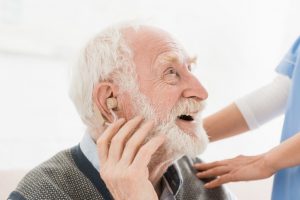Hearing loss in the elderly – a guide for the caregiver

How do you spot hearing loss in your elderly loved one?
Hearing loss in the elderly could be difficult to note and observe.
And thus, you and your loved one might seek interventions late. This could pose a safety threat for your loved one.
Hearing loss can mean they don’t hear warning alarms or that they don’t hear a car coming as they cross the street.
In this post, we’ll chat about the signs of hearing loss you should look out for, what interventions you can seek and how to keep your loved one safe.
Hearing loss in the elderly – a guide for the caregiver
The gradual hearing loss that happens as we grow older is a common condition.
In fact, according to the United States National Institute on Deafness and Other Communication Disorders, approximately 1 in 3 adults between 65 and 74 years will experience age-related hearing loss.
Furthermore, half of the people over 75 years old have some age-related hearing loss.
Therefore based on statistics alone, the chances that your loved one will have hearing loss as they age is high.
But you can be prepared for it.
Hearing loss signs to look out for
What signs should you look out for when it comes to hearing loss?
- One of the first signs to develop may be an inability to hear high-pitched sounds. Your loved one may have trouble hearing the voices of females or children.
- You find that you have to repeat a sentence multiple times to your elderly loved one when you didn’t have to do this before.
- You might also notice that your loved one turns the television or radio volume higher than usual.
- Having a conversation with your loved one over the phone has become more difficult because of their hearing loss.
- Your loved one may also have extra difficulty hearing in areas that are noisy.
- They may also complain about having a ringing sound in their ears.
- You may notice that they repeat sentences people have spoken to them wrongly.
When you start noticing any of these signs, it is time to consider intervention for your loved one.
…but what causes hearing loss in the elderly?
It’s difficult to distinguish between hearing loss that comes purely from aging and that which comes from lifelong exposure to noise.
What doctors and scientists do know however, is that special cells called stereocilia (sensory hair cells) can become damaged from loud noises, certain medications or from chronic illnesses like hypertension and diabetes.
Thus, reducing exposure to loud noises, and properly managing chronic health conditions can help to reduce hearing loss.
However, we still don’t know how to fully protect people from age-related hearing loss.
What you can do to help as a caregiver
Hearing problems can be serious. Thus, it is important that you encourage your loved one to see a doctor right away.
This could start with a primary doctor who may then refer your loved one to see an otolaryngologist (commonly called an ENT doctor) or an audiologist.
These professionals may recommend different interventions including:
- Hearing aids – These are external devices worn around the ear.
- Cochlear implants – Cochlear implants are surgically placed. If your loved one’s hearing loss is severe, a cochlear implant could be an option for them.
- Assistive listening devices – These may include devices that amplify sound so your loved one can hear what is being said.
- Bone anchored hearing systems – This is also surgically implanted and will help to transmit sound directly through bones around the ear and directly into a person’s inner ear.
- Lip reading – Your loved one may be trained to read people’s lips as they speak to make out what a person is saying.
Hearing loss is a challenge to everyone involved and can pose a safety hazard.
When you and your loved one notice signs of age-related hearing loss early, you can seek the right interventions early.
Enjoyed this post? Share it with someone else.
